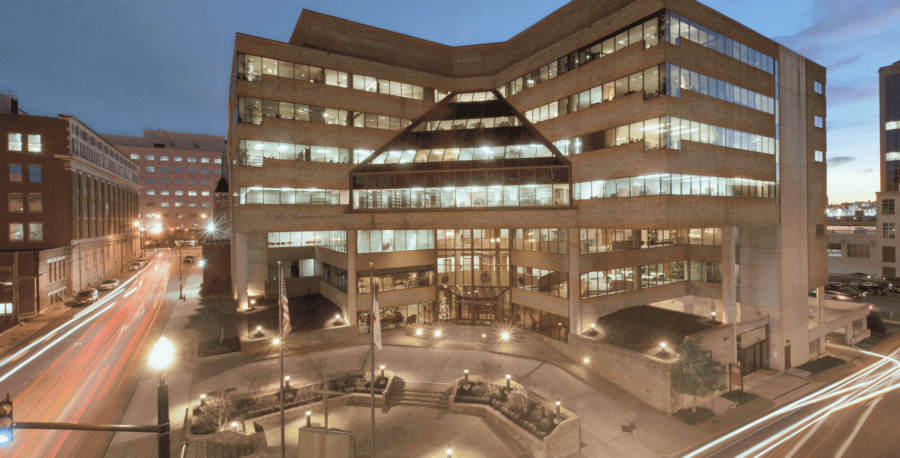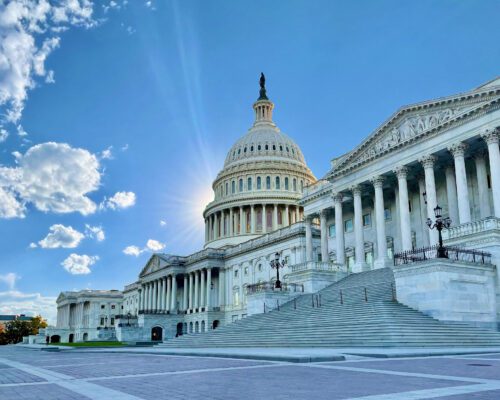May 8, 2020, marks one of the anniversaries of the founding of what would become the Ethics and Religious Liberty Commission (more on those others below). The ERLC is the Southern Baptist entity tasked with speaking for Southern Baptists in the public square and speaking to Southern Baptists on matters of moral importance. Below are some highlights from the history of the ERLC and all its previous versions.
What’s in a name?
The Ethics and Religious Liberty Commission is just the latest name in the history of this entity. Previously, it has been called the Christian Life Commission (1953-1997) and Social Service Commission (1947-1952). Also, depending on how you want to date the founding of ERLC (information below), you could include a previous Social Service Commission (1913-1942) and a standing Committee on Temperance (1908-1913).
Each of these names has focused the organization at that particular time. The initial commissions were sporadic and worked on individual assignments rather than having a comprehensive agenda, focusing more on prohibition than other goals. As time progressed, the organization came to address more and more needs, prompting the change in the name. For example, the Committee on Temperance and Social Service had little to say about the 1918 flu epidemic, whereas the ERLC has written extensively about the 2020 coronavirus pandemic.
The name change from the Christian Life Commission (the previous name of the organization) to the Ethics and Religious Liberty Commission represented the absorption of other committees and a commitment to the importance of this first freedom.
When did the ERLC begin?
As I mentioned above, there is some debate about when the organization that would become the ERLC began. Southern Baptists have been organizing and weighing in on social issues since their founding. However, the formalization of an entity to address the moral and spiritual concerns of Southern Baptists in the public square represented a new attempt to work together for the goal of bringing the gospel to bear on social issues.
If you were to date the organization based on formalization and a line of discernible work, then the earliest date of the commission’s founding would be 1908 with the creation of the Standing Committee on Temperance led by Arthur James Barton, which was the precursor to the Social Service Commission. In 1913, the Social Service Commission was founded. Barton would lead the group until 1942 (through various name changes) without pay.
However, if you were to date the commission based on when it first received official funding from the Southern Baptist Convention, then you would begin in 1942 under the leadership of Jesse Weatherspoon. A.J. Barton had occupied his position as head of the organization without pay for more than 30 years. In 1942, the SBC first formally apportioned money ($1,000) from the convention for the commission. Previously, the Sunday School Board (the precursor to LifeWay) had helped to financially support the organization and work of Barton.
The ERLC recognizes the need for thoughtful engagement in every realm of society and seeks to provide Christians with resources for engaging the culture with the truths of the gospel.
But it was not until 1947 (hence the current anniversary) that the leader of the organization was recognized with a title that was equivalent to an entity head and received Cooperative Program funding on a continual basis. Hugh Brimm was the first person to lead the organization when it was formally receiving funding from the SBC, and he was also given the title of “Secretary-Treasurer of the Social Services Commission.” This position was a title equivalent to other entity heads and corresponds (loosely) with the current position of president for SBC entities.
Regardless of whether you date it to initial work (1908), funding (1942), or a recognized title (1947), there has been a concerted effort on the part of Southern Baptists to bring the gospel to bear on issues of moral importance in culture for over a century.
Significant leaders in the history of the ERLC
There have been a number of leaders (and again, the founding makes it tricky to decide who is in or out) throughout the agency’s tenure. Though there is not space to describe all of them below, I have chosen to highlight some who have proved significant in the latter trajectory of the organization. A full list of the past leaders is also below with their dates of service.
Arthur James Barton
As the first leader of the organization that would eventually become the ERLC, Barton stands unparalleled for his work for the organization. He worked, without convention pay, for over three decades. Though initially commissioned to lead the Committee on Temperance, he would also lead the Social Service Commission to address a host of other issues. He was noted for his work in crafting the 18th Amendment, which prohibited the sale of alcohol, and remained committed to that cause until his death in 1942. It was not until after his death that the commission received funding ($1000 in 1943, and a percentage of Cooperative Program funds in 1947). This makes the work he and the standing committee accomplished all the more remarkable.
Foy Valentine
Valentine represents an important figure in the life of the ERLC for several reasons. First, he, and Weatherspoon before him, supported efforts that today would fall under the umbrella of racial reconciliation. Valentine worked diligently to lead the convention to recognize the dignity of all peoples, especially African Americans. In his 1960 address, he encouraged the convention to help African Americans “to secure [equal rights] through peaceful and legal means and to thoughtfully oppose any customs which may tend to humiliate them in any way.” Valentine’s work, and many others as well, was crucial in setting a foundation for what would eventually be the Resolution On Racial Reconciliation On The 150th Anniversary Of The Southern Baptist Convention. Though Valentine was correct in his views on race, he also represented the drift left of the convention and was a member of the moderate wing which prompted the Conservative Resurgence in the 1970s and 80s within the Southern Baptist Convention.
Richard Land
Richard Land was the first president elected to the Christian Life Commission after conservatives were able to appoint a leader. Land moved the commission back to its historic biblical roots and was a force for theological conservatism. Land helped to move the commission into new media avenues, including regular television appearances and a daily radio show. He, building on the work of Valentine, was essential in the crafting and passage of the 1995 Resolution on Racial Reconciliation. He also emphasized the role that the commission had for protecting religious liberty. Land also was the first person to serve as president of the Ethics and Religious Liberty Commission (the name was changed in 1997). His service ended in 2013 after 25 years, making him one of the longest serving heads of the organization.
Russell Moore
Russell Moore was appointed president of the ERLC in 2013 following Land’s retirement. During his presidency, the ERLC was instrumental in launching the first Evangelicals for Life conference, a whole-life, pro-life gathering centered around the March for Life. This conference aimed to help evangelicals see the connection between a theology of the image of God and issues beyond just abortion, recognizing the inherent dignity of all people as those made in God’s image. Additionally, in 2018, the ERLC, along with The Gospel Coalition, convened the MLK50 conference, which marked 50 years since the death of Dr. Martin Luther King Jr. It also pointed to the ongoing work being done and needed within evangelicalism and the wider culture of gospel justice and reconciliation for racial minorities. His tenure was marked by an unwavering commitment to the defense of religious liberty for all peoples, including non-Christians such as the Uyghurs of China, as well as taking steps to ensure that the SBC would be a place where victims of sexual abuse were safe and cared for.
- Arthur James Barton (1908-1942)
- JB Weatherspoon (1942-1947)
- Hugh Brimm (1947-1953)
- Acker Miller (1953-1960)
- Foy Valentine (1960-1987)
- Larry Baker (1987-1988)
- Richard Land (1988-2013)
- Russell Moore (2013-2021)
- Brent Leatherwood (2022-present)
Significant areas of work throughout the history of the ERLC
The ERLC continues to work in a long line of cultural engagement on a number of social issues. Although it is impossible to cover all of them, there are several that stand out as major themes in the work of the organization.
Religious liberty
First, religious liberty was not an initial concern because it was the area of the other committees. However, with the absorption of the Public Affairs Committee, the organization took on the role of being the denomination’s strongest advocate for religious liberty. This is reflected in the name of the organization, and its ongoing work at both the state and federal level. The ERLC has worked to protect this right because of its intrinsic connection to the Baptist tradition and the belief that each person has the right to worship as they please without fear of government interference.
As early American Baptist John Leland often argued, because the government will not answer for a person’s soul at judgement, it should not direct that soul in matters of religion. The ERLC continues this work.
Human dignity
Another area of work is that of human dignity. This inclusive term includes a holistic approach to questions of life, dignity, and worth. The ERLC has not always carried out the truths of the gospel perfectly in this area. Valentine did not oppose the 1971 resolution on abortion which was supportive in some cases, and Barton was supportive of segregation practices. However, even in those areas there have been at least small hints that Southern Baptists were seeking to uphold the truth that each person was created in the image of God. Barton supported segregation, but he also supported theological education for African Americans and urged the convention to support this work (even as he urged them to not integrate). In contrast to Valentine, Richard Land and Russell Moore have been tireless advocates of the preborn. Both Land and Moore worked on issues of race and helped to pass the 1995 Resolution (Land) and organize the MLK50 event which brought together African American and white Christians to think on the legacy of Martin Luther King (Moore).
The current staff of the ERLC stand in a long line of Southern Baptists who recognize the worth of every person and seek to uphold and proclaim their dignity as people of God.
Cultural engagement
The final area of importance is that of cultural engagement. The work of the ERLC (and its previous versions) has always been to engage on the issues of importance to Southern Baptists. This has included work on poverty, gambling, morality in public office, hunger, public policy, and popular culture. Southern Baptists have long recognized that Christians have a duty to speak into the culture with the truths of the gospel. This is not limited to one area. Rather, it encompasses every place where a Christian goes in their life. To quote the Dutch theologian Abraham Kuyper, “There is not a square inch in the whole of our human existence over which Christ, who is Sovereign over all, does not cry, ‘Mine!’”
The ERLC recognizes the need for thoughtful engagement in every realm of society and seeks to provide Christians with resources for engaging the culture with the truths of the gospel.










